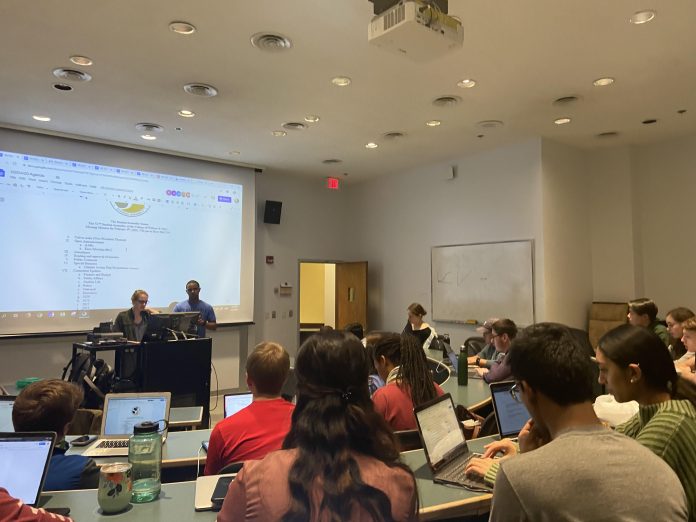At the meeting of the College of William and Mary’s 327th Student Assembly Feb. 4, senators discussed the benefits and drawbacks of passing two sustainability resolutions, one addressing the student body and another addressing the College’s Board of Visitors.
At the beginning of the meeting, senators were reminded that now until the end of February, SA meetings will be taking place in the College’s multiple graduate schools as an effort to reach out to more graduate students. For Feb. 11’s meeting, SA will meet on the Graduate side of the Raymond A. Mason School of Business in room 1008. Feb. 18, SA will meet at the Marshall-Wythe School of Law in room 245, and lastly, SA will meet in the School of Education Feb. 25 in room 2060. The meeting in the School of Education will take place at 7:30 p.m., half an hour behind SA’s usual 7 p.m. meeting time.
The Divest from Fossil Fuels Resolution and The Sustainability Climate Action Resolution were contested between senators on whether only one or both Sustainability resolutions should be passed. A third discussion, that senators ultimately shot down, regarded merging the two documents into one large comprehensive Sustainability Resolution.
Sponsored by Sen. Joshua Panganiban ’20, the Sustainability Climate Action Resolution aimed to write a Resolution that would guide and work alongside students to alter their habits to have a better environmental impact on the campus and in the future. Panganiban wanted to focus on Scope III of the College’s goal to make the campus carbon neutral by 2030. Currently, the College’s plan addresses Scope I and Scope II of the College’s goal that targets the College’s infrastructure and actions. Scope III turns to the individual and their habits, and currently contributes to 20 percent of the College’s carbon footprint, according to Panganiban.
“William & Mary’s plan is to have a neutral campus and then do a lot of research with it, and move that into learning and empowerment, which gives each student a culture of sustainability so that when they go out into the real world, they keep pushing that toward their companies, their NGOs, or whichever country they go back to,” Panganiban said.
Senators decided to table the bill for next week’s meeting due to the amendments suggested during the meeting.
Senators then turned to the Divest from Fossil Fuels Resolution, which includes provisions that would ask the Board of Visitors to divest from all of the College’s investments in organizations supporting hostile climate policies, and to commit to transparency regarding the College’s investments.
The BOV met on campus this week, causing some senators to urge the rest of SA to vote in support of the bill in order to make a stronger statement to the Board about the wishes of the student body.
“I do not care about what the BOV thinks about this,” Sen. Will Wasson J.D. ’21 said. “I mean, we’re in communication with one BOV member, that’s great. But if we say we support this, we should support it, it doesn’t matter what the BOV thinks. If we support this, we want them to support it, and we are their main investors. We are the ones that make them all the money that they use for this College and if this is what we want, we should tell them this is what we want.”
Sen. Zie Medrano ’20, meanwhile, argued that the use of certain terminology in the bill, such as the word “immediately,” was too strong and might be off-putting to the BOV. The senators agreed to amend the bill by removing the word “immediately” and by softening the call for investment transparency on the part of the BOV.
Senators also passed the Competition Travel Fund Establishment Amendment, which would expand the purview of SA’s current Competition fund that provides money for organizations when attending certain national competitions. The new Amendment would expand the fund to allow organizations to ask for travel and lodging expenses through the competition fund, which was previously not allowed and rather, had to be asked for during SA’s budget allocation process.
Prior to passing the amendment, organizations had to predict a year out what travel and lodging expenses might look like, and now, organizations can ask for funding four months out before a competition with a better picture of those expenses.
Finance Chair Sen. Meghana Boojala ’22 wanted to add the amendment as currently the competition fund is underused and therefore the money is being insufficiently utilized.
Also at this week’s meeting:
- Andrew Scarafile ’20 was sworn in as a new Class of 2020 Senator by Review Board Chair Hank Blackburn ’20. Scarafile will fill the seat left vacant by the absence of Hailey Ulrich ’20, whose appointment was declared unconstitutional.
- Sen. Patrick Salsburg ’21 introduced the Put an End to Unjust Prison Labor Resolution, which calls on the Virginia General Assembly to pay prison workers the Virginia minimum wage.
- Wasson introduced the Ad-Hoc Reparations Committee Act, which calls for the creation of a semester-long ad hoc committee to investigate the viability of reparations on campus.

